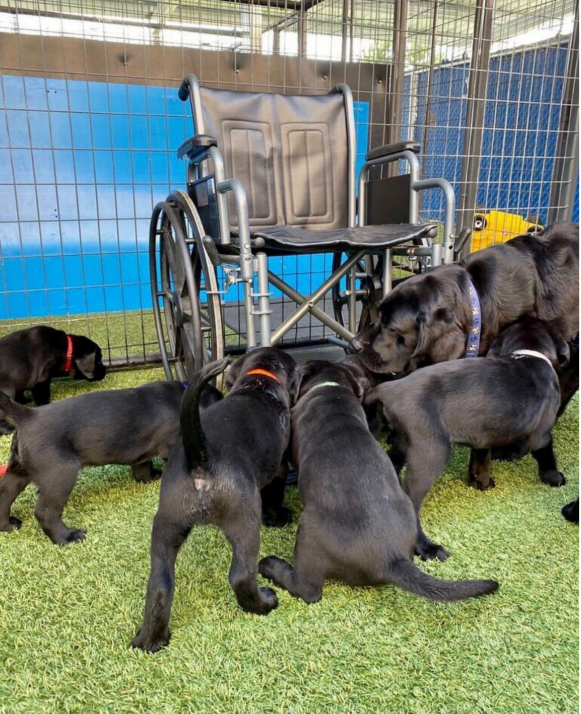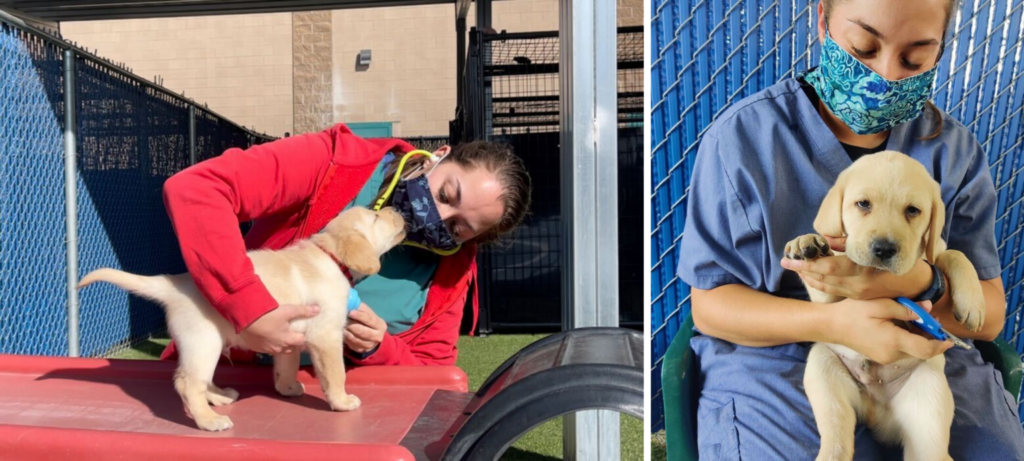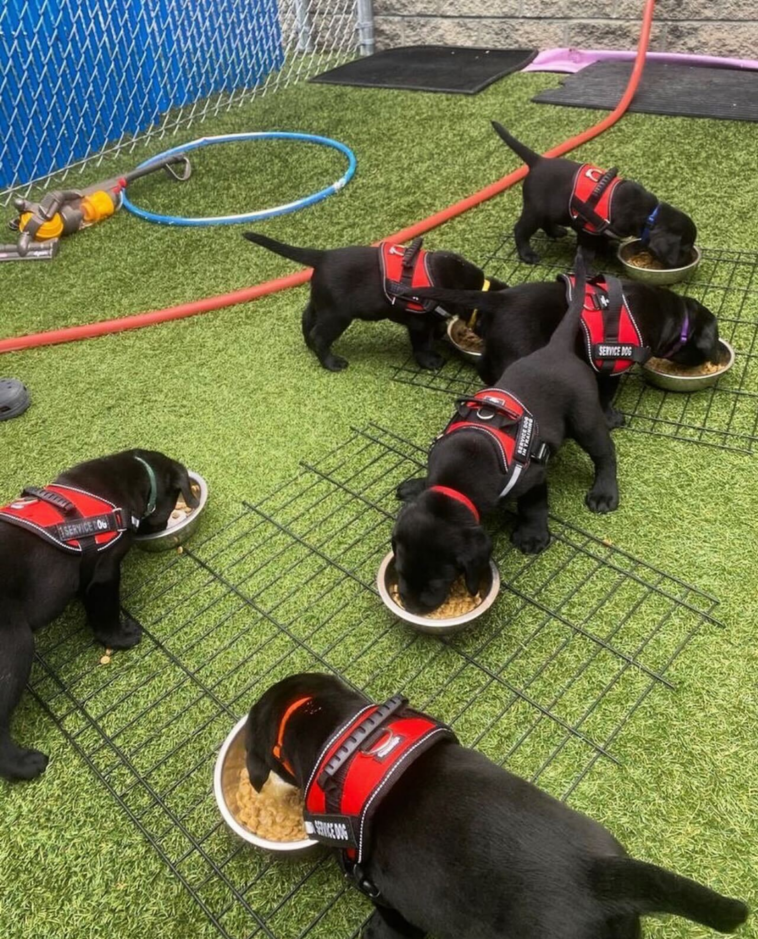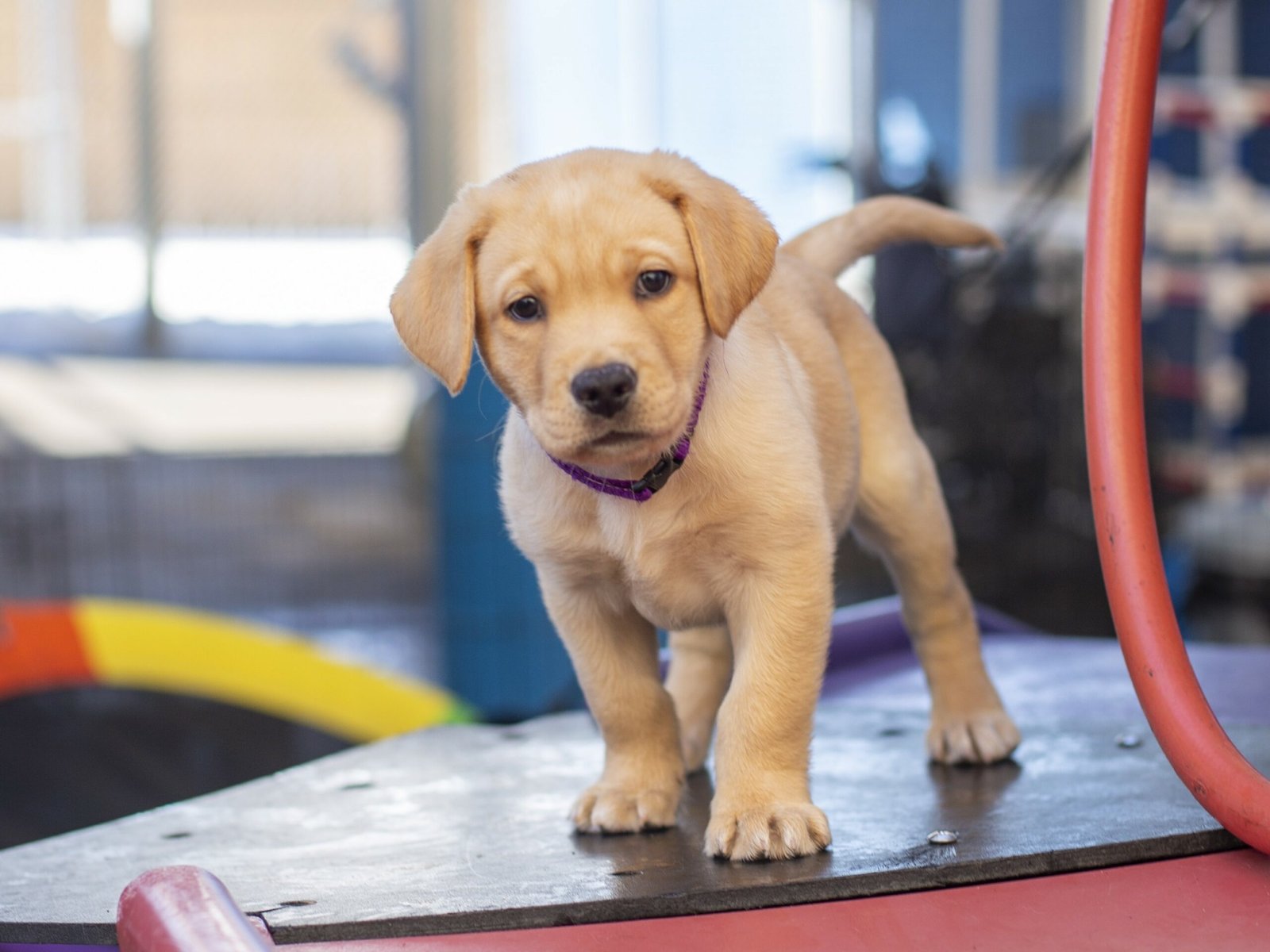FSD Puppy Socialization: Weeks 5 and 6

Ever wonder how FSD puppies with a purpose grow up to become so confident, dependable, and loving? Genetics play a big part, but socialization is where the magic really happens! From their very first few weeks of life in the FSD nursery, our pups get all the love, support, enrichment, and socialization they need to grow into self-assured and hard working service dogs, professional therapy dogs, and skilled companion dogs.
In this blog, you’ll learn where our tiniest trainees are at in their development at ages 5 and 6-weeks-old and the types of socialization activities, stimuli, and environments they are exposed to that help shape them into life-changing assistance dogs.
Pssst… If you haven’t already read about the development and socialization of FSD puppies ages 1 to 2-weeks-old and 3 to 4-weeks-old, we recommend starting there!
Week 5: Puppy Pre-School is in Session
At 5-weeks-old, puppies are developing a wide range of facial expressions. They’re also gaining more adult-like motor skills, weaning off mom’s milk, and moving to solid kibble. Their senses continue to sharpen, and they become more familiar with everyday stimuli, such as the sound of TV and radio, vacuums, and common scents.

FSD staff and volunteers are pros at making sure our puppies with a purpose experience a wide range of stimuli in different environments every day. Their space is decked out with mirrors, mobiles, tough plushies, statues, balls, umbrellas, and spinners to be explored. We also introduce the puppies to medical equipment, which is something they may work around every day if they grow up to be placed as a service dog for a first responder, a professional therapy dog in a hospital setting, or a client who uses a wheelchair, cane, or other medical device.
When it comes to structured activities, staff and volunteers throw fashion shows adorned with big hats, sunglasses, and costumes to prepare the puppies for things they may encounter in the real world at events, parties, parades, or even during a regular day in the office! Additionally, FSD team members lie down and sit quietly around the puppies, which exposes them to people in a variety of positions.
Other activities include people carrying packages or dragging large suitcases near the puppies, experiencing different indoor and outdoor spaces, and walking on leash with one or two of their siblings. They experience their first car rides and start spending time with resident FSD nursery cat Calvin, who helps get them used to other pets. We also begin implementing weekly baths to expose them to water, starting by touching the puppies with wet rags and having them stand in shallow pools of water.
By now, the puppies are starting to practice wearing typical gear—collars, leashes, gentle leaders, tiny service dog in training vests, sweaters, and booties. Bath time and mock vet appointments are on the schedule, too. And to get them comfortable with different sounds, they listen to recordings of fireworks, dogs barking, planes, orchestra music, and babies crying. Plus, they start attending “puppy pre-school,” where they work on basic cues like “sit” and “down.”

Week 6: Welcome to a Whole New World
By 6-weeks-old, it’s become a whole new world for FSD puppies! The pups are stronger, bigger, more coordinated, and have a lot more baby teeth. They’re confident exploring large spaces and new things, are getting better at potty training, and begin to greet their siblings by sniffing their noses and tails. They’ve also gained a lot more awareness of their relationships with humans.

Because they have more capacity to learn and retain information, they work on “sit,” “down,” and standing on different surfaces every day. They even get “TV time,” where they watch nature channels with engaging visuals and sounds. When the television is off, they listen to recordings of the sounds of coffee shops, hospitals, door bells, knocking, farm animals, thunderstorms, people shouting, car alarms, and more.
6-week-old puppies start spending more solo time with staff and volunteers, which helps them learn to feel more secure and independent without their siblings and mom nearby. They’re introduced to new activities such as watching volunteers color on a coloring sheet using scented markers. This teaches the puppies cause and effect and allows them to experience new sights and smells. They’re also exposed to swings and mannequins in the hallway, people riding on bikes and skateboards, and animatronic toys. Occasionally, they get to ride in a cozy cat backpack around the nursery, play on piano mats, and stand on elevated surfaces.
These types of experiences make a big impact on the puppies’ confidence, curiosity, and independence. While each puppy is their own individual with a unique personality, structured socialization and enrichment helps prepare them for a life of service and adventure.
Stay tuned to learn more about the socialization process of FSD puppies during weeks 7 and 8!

If this story made your tail wag, you may also like:
Contact Erin Conley at econley@

